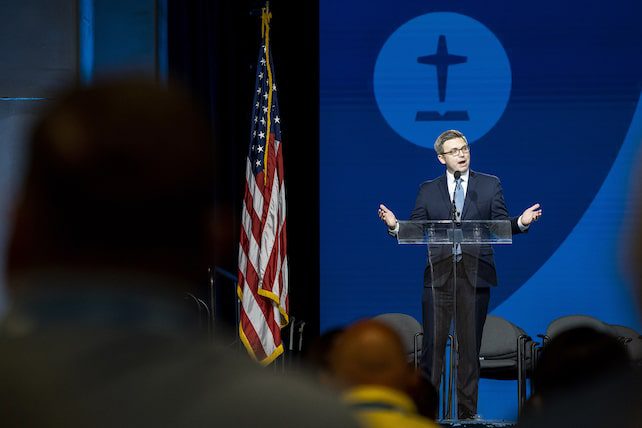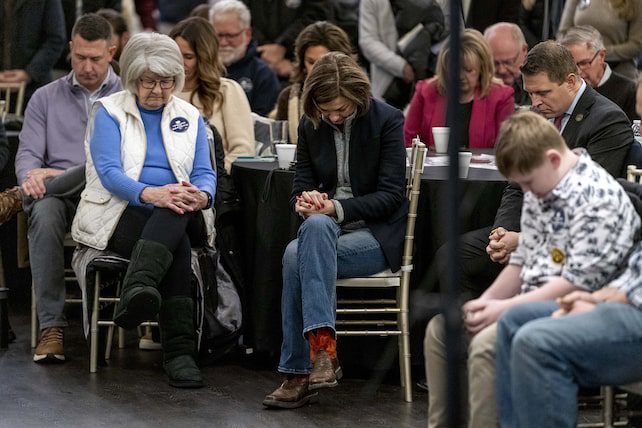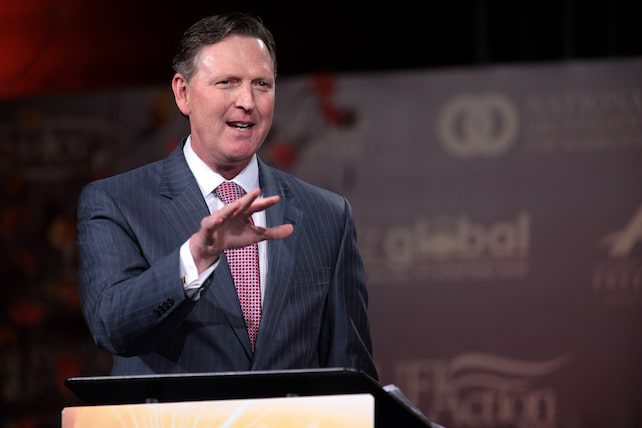These ’90s leaders were angry that their support for Republicans hadn’t led to many results on issues like abortion. “The go-along, get-along strategy is dead,” Land, then president of the Ethics and Religious Liberty Commission of the Southern Baptist Convention, told The New York Times in 1998. “No more engagement. We want a wedding ring, we want a ceremony, we want a consummation of the marriage.”
RELATED: How religion and politics will mix in 2024 – three trends to track
Those promises would eventually be cinched by Trump, who as president delivered the Supreme Court conservative majority that spelled the end of Roe v. Wade, long an evangelical goal. Some evangelicals thought the cost was too high. Trump, a twice-divorced reality TV star, shared few of their beliefs, and they bridled at his caustic rhetoric.
But by 2023, faith-based politicos like Vander Plaats are finding the wished-for marriage didn’t put them in charge. Christian leaders who oppose Trump on ethical grounds now often find themselves exiled from fellow believers who more than ever want to vote for their man, not their spirituality.
Burge speculated that many evangelical leaders treat Trump as some mainstream Republicans in Congress do: back him in public, afraid of the consequences of opposing him, while griping about him behind the scenes.
“A lot of pastors are publicly saying nothing or giving tacit approval of Trump, and then going home to their wives and saying, ‘This is stupid. I don’t want this,’” said Burge. “They are in a terrible spot.”

Evangelicals, however, may determine the race for second place. Former South Carolina Governor Nikki Haley, who served as Trump’s ambassador to the United Nations, “needs to get DeSantis out of this race,” said Wear. “If she comes second in Iowa, I think that will do it, and if she’s going to do that, she needs to at least hold her own among evangelicals.”
Complicating the picture further is the statistical difficulty in separating voters’ religion from their political allegiance. Some white evangelicals, especially those who aren’t churchgoers, appear to be less motivated by faith than fear about their declining influence in America, driven by demographics and cultural change, said Burge.
“In some ways what you’re seeing is the death throes of a majority religion in its final days,” he said. “And it’s not pretty.”
Brent Leatherwood, president of the ERLC, the public policy entity of the Southern Baptist Convention, suspects that Trump will win the Iowa caucuses and go on to win the Republican nomination, setting up “a replay” of the 2020 election.
“What’s ironic,” he said, “is that it seems no one really wants that.”
Leatherwood, a former executive director of the Tennessee Republican Party, said that when he became ERLC president, he pledged not to try to tell people who to vote for. Instead, he’s focused on the ethical principles that should guide Christians in politics.
He believes that voters are tired of the political, social and economic chaos and polarization of recent years and would like to see some stability in the nation’s leadership.
“They want some peace and quiet on the political arena,” he said. “Think about all the political, social, and cultural upheavals that we’ve seen over the last 15 years. The Great Recession. Obergefell. The drama of the 2016 election. COVID. Jan. 6. The end of Roe. Historic levels of inflation. That’s not even accounting for what we are seeing on the international stage.”

It’s unlikely, he added, that any candidate will be able to deliver that, no matter their party. “I’m not sure that it is reasonable to expect calm, and no candidate has a magic wand or a set of principles or a group of advisers that he or she can call upon, to set the world at ease.”
Leatherwood said Christians ought to be wary of being closely tied to political parties or the temptation to ignore principles in favor of political gains. Instead, he said, candidates should be evaluated on their ethics and their policies.
If no candidate is fit for office, he added, evangelicals and other Christians should consider withholding their vote. “A principled abstention by a sizable enough group of voters,” he said, “would send an important message.”
RELATED: Support for Israel becomes a top issue for Iowa evangelicals key to the first Republican caucuses
This article originally appeared on ReligionNews.com.


